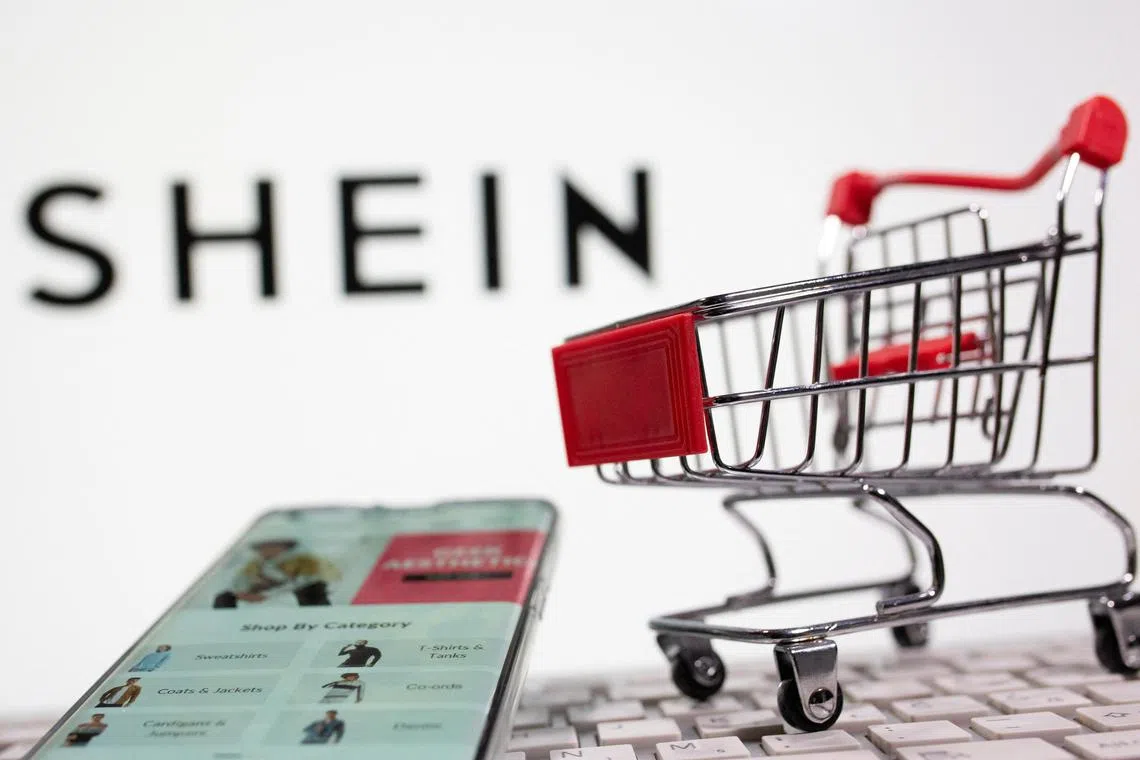‘They weren’t even sweating’: Influencers blasted for Shein factory tour
Sign up now: Get ST's newsletters delivered to your inbox

Backlash ensued after Shein took a half-dozen US influencers on a tour of its factories in China.
PHOTO: REUTERS
NEW YORK - When fast-fashion giant Shein invited Kenya Freeman on a free two-week trip to China, she was thrilled.
It has become a status symbol for Instagram and TikTok creators to be taken on paid excursions by brands, and Ms Freeman, who had also been designing clothes for Shein for 2½ years, saw it as a major opportunity.
But, while brands often plan such trips to promote new products or generate online buzz, Shein’s pitch was unusual: Ms Freeman would be among half a dozen influencers from the United States who would tour its factories and a shipping centre, and meet its workers.
Shein, which has been under growing regulatory scrutiny as it grapples with accusations that its goods are made with forced labour, was hoping that the creators would post a more upbeat narrative about the company during their travels.
That part worked: Ms Freeman created 11 Instagram posts, including videos, extolling Shein and its labour conditions on Instagram, where she has 31,600 followers.
She and other creators enlisted by Shein highlighted tidy stacks of clear Shein packages, robots moving merchandise and rows of happy workers.
“They weren’t even sweating,” one creator, Ms Destene Sudduth, posted to Instagram and TikTok.
But, rather than win hearts and minds, Shein and the creators have been roundly blasted in the past week by social media users who have viewed the videos incredulously.
Shein has been forced to issue a statement saying it was “saddened” to see the backlash against its creators and has conducted what Ms Freeman described as a “wellness check” to gauge how creators were faring after the torrent of online vitriol.
The creators have been deleting negative comments on their social media accounts and posting defensive videos.
And the trip has become a cautionary tale for marketers, as Shein’s efforts to help its reputation using influencers managed to alienate consumers and draw even more attention to allegations of unsavoury business practices.
While influencer trips have ramped up on TikTok and Instagram, “I really don’t know of any other situation where there was an overt agenda like the Shein example”, said Ms Mae Karwowski, founder of Obviously, an influencer marketing agency.
“It required such a suspension of disbelief and clearly came across as a sort of propaganda,” she said.
Shein – pronounced SHE-in – an online retailer founded in China more than a decade ago, has quickly gained popularity among US consumers, particularly teenagers and 20-somethings, for its easy-to-use app and low prices on a wide assortment of trendy apparel and accessories.
While most fast-fashion companies have long faced criticism over how they produce their goods, Shein has been accused of using forced labour in its supply chain and of copying designs; it has also been scrutinised for its business model of shipping cheap goods directly to the doors of American shoppers.
Shein has said it conducts its business “lawfully”.
The company, which is now based in Singapore but still produces clothing in China, has also received more attention as part of a broader crackdown from US lawmakers on Chinese-owned companies like TikTok.
Shein, which has reportedly been contemplating an initial public offering
The company started a unit for reselling its apparel to stave off criticism about sustainability, tapped independent designers to create new lines and hired US lobbyists.
“Shein essentially launched this campaign where it’s quite clear there is a desire to shift the narrative around the working conditions in these factories,” said Mr Krishna Subramanian, a founder of influencer marketing firm Captiv8. “It’s more effective and believable when it’s done from an influencer standpoint than by the brand themselves.”
In this case, the videos landed with a thud as they painted an oddly rosy view from factories in Guangzhou, China, and sought to cast online influencers known for designing clothing and promoting body positivity in a quasi-journalistic role.
While critical reports about the company have not seemed to deter the retailer’s fans, the overt praise stood out.
As creators sought to tell their followers that they interviewed happy workers who were surprised about “rumours” about Shein in the US, users left comments like “integrity is worth more than a trip”, “did you read ANY news about this company?” and “the gaslighting is CRAZY!”
Hashtags related to the trip like #sheinbrandtrip, #shein101 and #sheinfactory have garnered millions of views, according to Trendpop, a social media analytics firm.
On TikTok, deleted videos from the creators took on a life of their own as people used the app’s editing tools to incorporate their own sceptical and horrified commentary.
“It’s a really clear example not to use creators who talk about specific things like lifestyle, fashion, body positivity and then try to get them to push a completely different agenda,” said Ms Karwowski, the influencer marketer. “That’s not going to work.” NYTIMES


